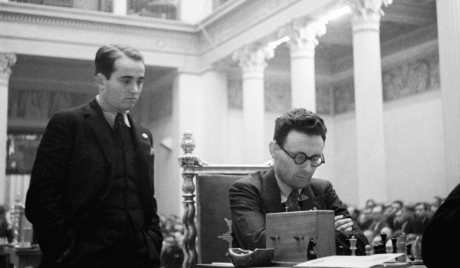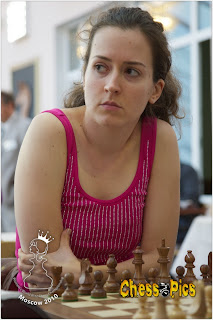Alexandra Kosteniuk's Chess Blog for Daily Chess News and Trivia (c) 2013
Hi everyone,
The sixth stage of the FIDE Grand Prix will be held in Paris, France, from 21st September to 5th October 2013. There will be one round a day. Bulgaria's Veselin Topalov has already won the top slot and qualifies. Here is the list of the participants for the Paris edition:
Bacrot, Etienne FRA
Caruana, Fabiano ITA
Dominguez Perez, Leinier CUB
Fressinet, Laurent FRA
Gelfand, Boris ISR
Giri, Anish NED
Grischuk, Alexander RUS
Ivanchuk, Vassily UKR
Nakamura, Hikaru USA
Ponomariov, Ruslan UKR
Tomashevsky, Evgeny RUS
Wang, Hao CHN
Official website: http://paris2013.fide.com/
The official hotel is: Pullman Versailles in Paris
Tournament venue: Chapelle de la Villedieu
Organizers: FIDE in copperation with FFE (President - Diego Salazar and Executive Director - Laurent Verat)
Chief Arbiter: IA Laurent Freyd
Deputy Arbiter: IA Anastasia Sorokina
Chairman of Appeals Committee: Israel Gelfer
Press Officer: Alina l'Ami
Hi everyone,
Even as the Chess World Cup comes to an end - with Vladimir Kramnik and Dmitry Andreikin to play the final - it is time to focus on the Grand Prix series. The series too will give two players entry to the Candidates 2014 as the Chess World Cup has for Kramnik and Andreikin.
The sixth stage of the FIDE Grand Prix will be held in Paris, France, from 21st September to 5th October 2013. There will be one round a day. Bulgaria's Veselin Topalov has already won the top slot and qualifies. Here is the list of the participants for the Paris edition:
Bacrot, Etienne FRA
Caruana, Fabiano ITA
Dominguez Perez, Leinier CUB
Fressinet, Laurent FRA
Gelfand, Boris ISR
Giri, Anish NED
Grischuk, Alexander RUS
Ivanchuk, Vassily UKR
Nakamura, Hikaru USA
Ponomariov, Ruslan UKR
Tomashevsky, Evgeny RUS
Wang, Hao CHN
The beautiful tournament Hall is Chapelle de la Villedieu
Official website: http://paris2013.fide.com/
The official hotel is: Pullman Versailles in Paris
Tournament venue: Chapelle de la Villedieu
Organizers: FIDE in copperation with FFE (President - Diego Salazar and Executive Director - Laurent Verat)
Chief Arbiter: IA Laurent Freyd
Deputy Arbiter: IA Anastasia Sorokina
Chairman of Appeals Committee: Israel Gelfer
Press Officer: Alina l'Ami
From Alexandra Kosteniuk's
www.chessblog.com
Also see her personal chess blog
at www.chessqueen.com
Don't miss Chess Queen™
YouTube Channel
www.chessblog.com
Also see her personal chess blog
at www.chessqueen.com
Don't miss Chess Queen™
YouTube Channel








































